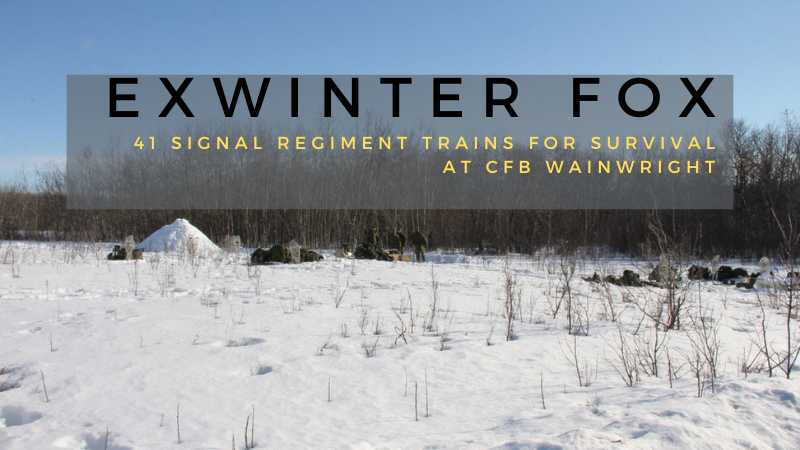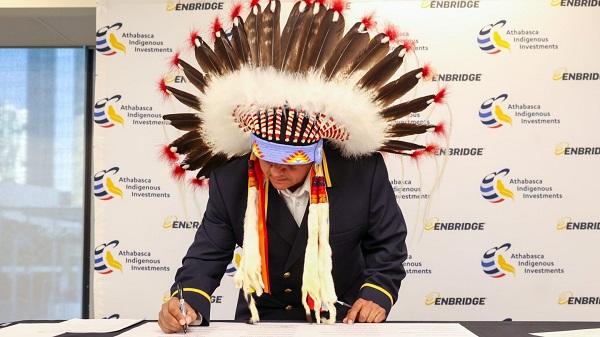Alberta
41 Signal Regiment trains for winter survival at CFB Wainwright

It’s always a great day when you can visit the troops and observe their training. I’m always impressed by the level of expertise and the sense of duty on display by the soldiers I meet and help support in whatever way I can.
Winter survival training is important for Canadian soldiers. Not only because Canada’s climate is harsh and soldiering is a year-round job, but also, because soldiers may be deployed to other cold parts of the world and it is important that they are prepared to operate in these extremes.
Winter survival training also helps soldiers to develop self-reliance, resourcefulness, and resilience, skills that are important in any operational environment. In order to do so, they need to be trained in winter survival skills such as how to build shelter, start a fire, navigate in the snow, trap an animal, and deal with hypothermia and frostbite.
Winter survival training is a key component of the overall readiness and preparedness of the Canadian Army and helps to ensure that soldiers have the skills and knowledge necessary to carry out their missions successfully and safely, even in the harshest of winter conditions.
On February 11th, Honourary Lieutenant Colonel Tara Veer and I had the opportunity to travel with the unit’s command team to CFB Wainwright to observe the troops in action.
Here’s a slide show that shows a few of the sights from our visit to the training site.
Lloyd Lewis is Honourary Colonel of 41 Signal Regiment, a communications unit assigned to 41 Canadian Brigade Group in Alberta.
Alberta
Made in Alberta! Province makes it easier to support local products with Buy Local program

Show your Alberta side. Buy Local. |
When the going gets tough, Albertans stick together. That’s why Alberta’s government is launching a new campaign to benefit hard-working Albertans.
Global uncertainty is threatening the livelihoods of hard-working Alberta farmers, ranchers, processors and their families. The ‘Buy Local’ campaign, recently launched by Alberta’s government, encourages consumers to eat, drink and buy local to show our unified support for the province’s agriculture and food industry.
The government’s ‘Buy Local’ campaign encourages consumers to buy products from Alberta’s hard-working farmers, ranchers and food processors that produce safe, nutritious food for Albertans, Canadians and the world.
“It’s time to let these hard-working Albertans know we have their back. Now, more than ever, we need to shop local and buy made-in-Alberta products. The next time you are grocery shopping or go out for dinner or a drink with your friends or family, support local to demonstrate your Alberta pride. We are pleased tariffs don’t impact the ag industry right now and will keep advocating for our ag industry.”
Alberta’s government supports consumer choice. We are providing tools to help folks easily identify Alberta- and Canadian-made foods and products. Choosing local products keeps Albertans’ hard-earned dollars in our province. Whether it is farm-fresh vegetables, potatoes, honey, craft beer, frozen food or our world-renowned beef, Alberta has an abundance of fresh foods produced right on our doorstep.
Quick facts
- This summer, Albertans can support local at more than 150 farmers’ markets across the province and meet the folks who make, bake and grow our food.
- In March 2023, the Alberta government launched the ‘Made in Alberta’ voluntary food and beverage labelling program to support local agriculture and food sectors.
- Through direct connections with processors, the program has created the momentum to continue expanding consumer awareness about the ‘Made in Alberta’ label to help shoppers quickly identify foods and beverages produced in our province.
- Made in Alberta product catalogue website
Related information
Alberta
Province to expand services provided by Alberta Sheriffs: New policing option for municipalities

Expanding municipal police service options |
Proposed amendments would help ensure Alberta’s evolving public safety needs are met while also giving municipalities more options for local policing.
As first announced with the introduction of the Public Safety Statutes Amendment Act, 2024, Alberta’s government is considering creating a new independent agency police service to assume the police-like duties currently performed by Alberta Sheriffs. If passed, Bill 49 would lay additional groundwork for the new police service.
Proposed amendments to the Police Act recognize the unique challenges faced by different communities and seek to empower local governments to adopt strategies that effectively respond to their specific safety concerns, enhancing overall public safety across the province.
If passed, Bill 49 would specify that the new agency would be a Crown corporation with an independent board of directors to oversee its day-to-day operations. The new agency would be operationally independent from the government, consistent with all police services in Alberta. Unlike the Alberta Sheriffs, officers in the new police service would be directly employed by the police service rather than by the government.
“With this bill, we are taking the necessary steps to address the unique public safety concerns in communities across Alberta. As we work towards creating an independent agency police service, we are providing an essential component of Alberta’s police framework for years to come. Our aim is for the new agency is to ensure that Albertans are safe in their communities and receive the best possible service when they need it most.”
Additional amendments would allow municipalities to select the new agency as their local police service once it becomes fully operational and the necessary standards, capacity and frameworks are in place. Alberta’s government is committed to ensuring the new agency works collaboratively with all police services to meet the province’s evolving public safety needs and improve law enforcement response times, particularly in rural communities. While the RCMP would remain the official provincial police service, municipalities would have a new option for their local policing needs.
Once established, the agency would strengthen Alberta’s existing policing model and complement the province’s current police services, which include the RCMP, Indigenous police services and municipal police. It would help fill gaps and ensure law enforcement resources are deployed efficiently across the province.
Related information
-

 espionage2 days ago
espionage2 days agoEx-NYPD Cop Jailed in Beijing’s Transnational Repatriation Plot, Canada Remains Soft Target
-

 2025 Federal Election2 days ago
2025 Federal Election2 days agoBREAKING from THE BUREAU: Pro-Beijing Group That Pushed Erin O’Toole’s Exit Warns Chinese Canadians to “Vote Carefully”
-

 Daily Caller2 days ago
Daily Caller2 days agoTrump Executive Orders ensure ‘Beautiful Clean’ Affordable Coal will continue to bolster US energy grid
-

 Daily Caller2 days ago
Daily Caller2 days agoDOJ Releases Dossier Of Deported Maryland Man’s Alleged MS-13 Gang Ties
-

 2025 Federal Election2 days ago
2025 Federal Election2 days agoAllegations of ethical misconduct by the Prime Minister and Government of Canada during the current federal election campaign
-

 John Stossel2 days ago
John Stossel2 days agoClimate Change Myths Part 1: Polar Bears, Arctic Ice, and Food Shortages
-

 Business2 days ago
Business2 days agoChina, Mexico, Canada Flagged in $1.4 Billion Fentanyl Trade by U.S. Financial Watchdog
-

 Opinion2 days ago
Opinion2 days agoLeft Turn: How Viet Nam War Resisters Changed Canada’s Political Compass








